Challah Bread
on Apr 20, 2023, Updated Jun 27, 2024
This post may contain affiliate links. Please read our disclosure policy.
Challah Bread, a delicious and beautiful symbol of Jewish tradition, has been an integral part of Jewish cuisine for centuries. With its distinctive braided design, rich flavor, and symbolic significance, this bread is cherished by Jewish families and admired by bread bakers around the world.
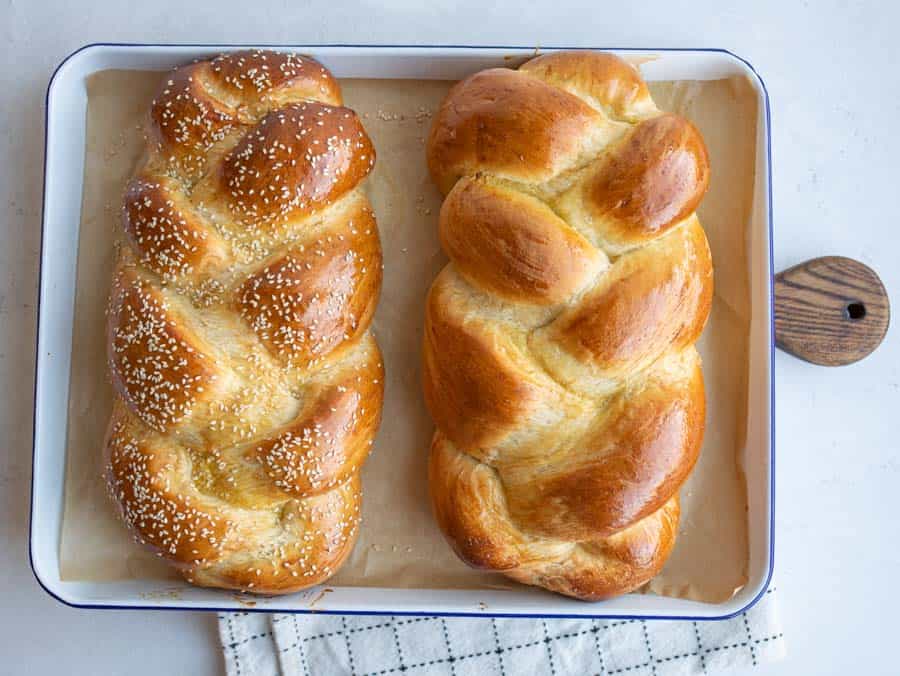
The History and Tradition of Challah Bread
Challah bread is an essential part of Jewish culinary heritage, with roots dating back to biblical times. The term “challah” is derived from the Hebrew word “חלה” (hallah), which means “portion.” This refers to the portion of dough that was traditionally set aside as an offering to the Temple in Jerusalem, as commanded in the Bible (Numbers 15:17-21). Today, it is customary to separate a small piece of dough before braiding and baking the challah, symbolizing this ancient practice.
Challah bread is primarily consumed during Shabbat and Jewish holidays such as Rosh Hashanah and Purim. Its braided design is believed to symbolize unity and continuity, while the circular shape often used for Rosh Hashanah represents the cyclical nature of life.
Table of Contents
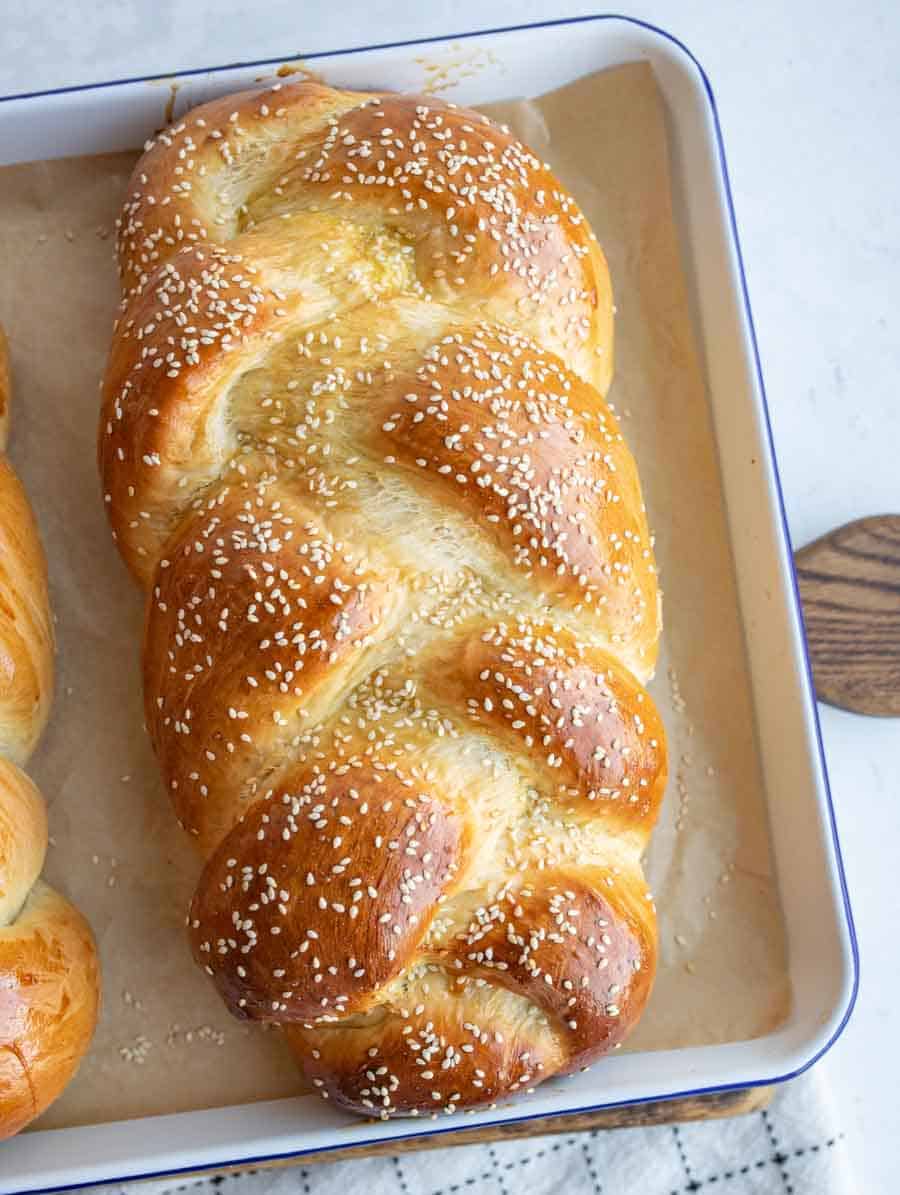
Who Eats Challah?
While challah bread is primarily associated with Jewish culture, it has gained popularity among people of all backgrounds. Its delicious taste and captivating appearance have made it a favorite in bakeries and homes across the globe. Challah has also inspired variations such as the water challah, which is made without eggs, and the challah roll, a smaller version of the traditional loaf.
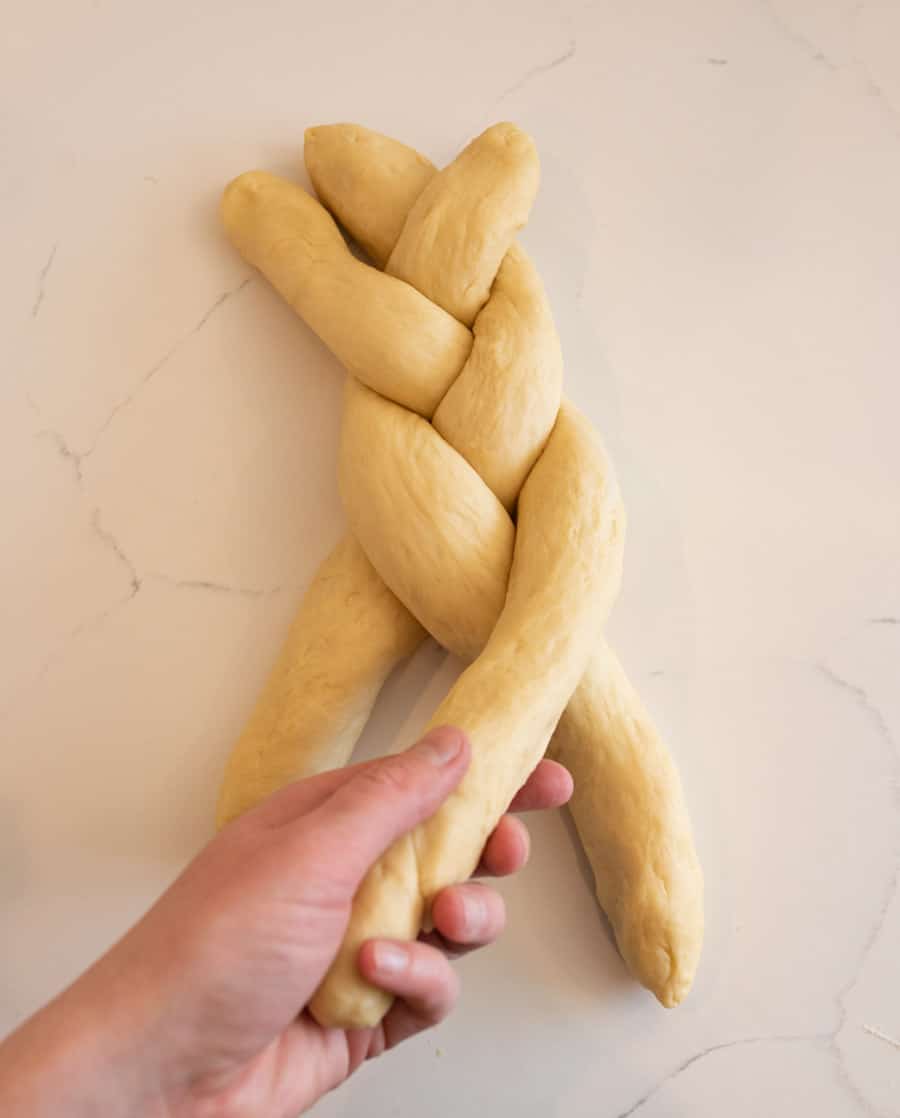
The Art of Braiding Challah Bread
The braiding of challah dough is an art form in itself, with various techniques used to create intricate designs. The most common braiding techniques involve three, four, or six strands of dough. A three-strand braid is the simplest and most traditional method, while more intricate braids can be created with additional strands.
To braid a three-strand challah, follow these steps:
- Divide the dough into three equal pieces and roll each piece into a long, even strand.
- Pinch the strands together at one end and begin braiding them, crossing the right strand over the center strand, followed by the left strand over the new center strand.
- Continue braiding until you reach the end, and then pinch the strands together to secure the braid.
- For more intricate braids, follow the same process but adjust the braiding technique to accommodate the additional strands. There are numerous online tutorials and guides available to help you master these more complex designs.
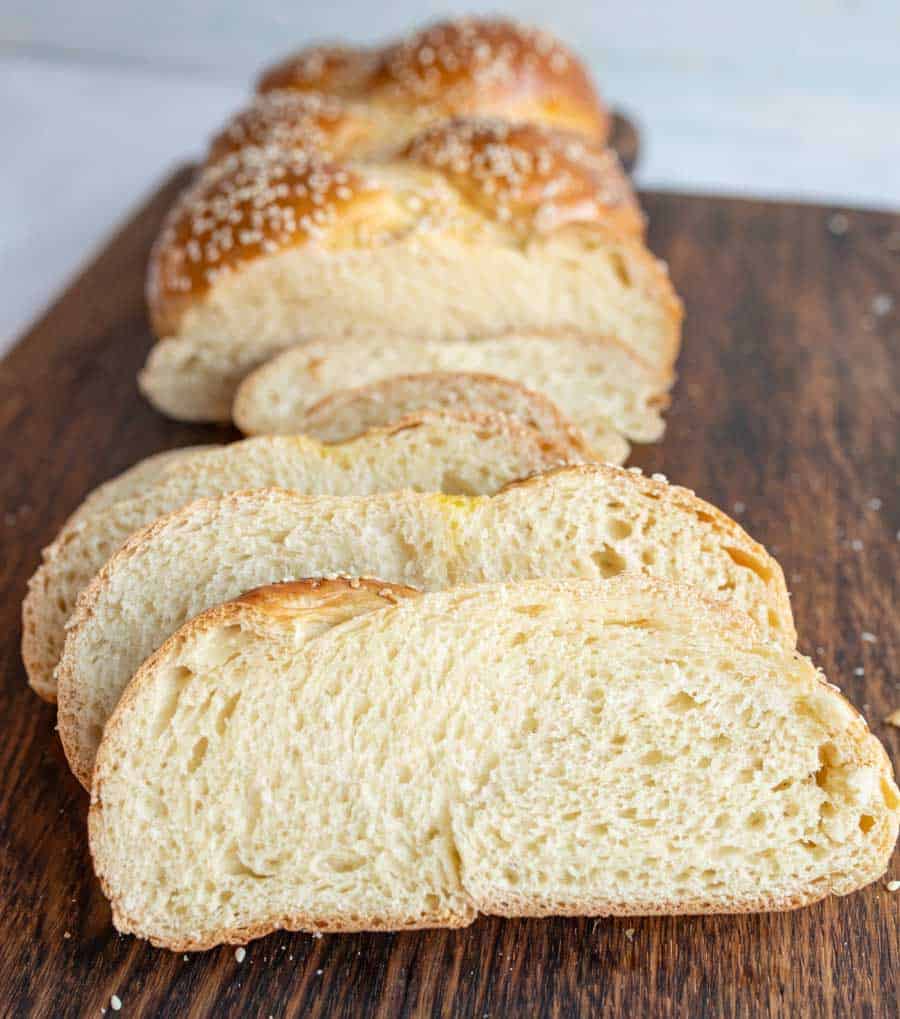
What Makes Challah Special?
I had the chance to go on a food tour of the beautiful country of Israel with Vibe Israel. This trip was incredible, we ate the most amazing food from cultures all over the world (Israel is such a melting pot!), and we even had the chance to attend a Shabbat dinner on Friday night with an Israeli family.
Sharing a Shabbat dinner with the Alon family in their home was a truly meaningful experience that I’ll remember forever. Breaking challah bread together and enjoying the meal together is why I picked this recipe to share with you.
This challah bread is incredibly delicious and it reminds me of my travels to Israel. Challah bread has a little bit of magic braided into it I think!
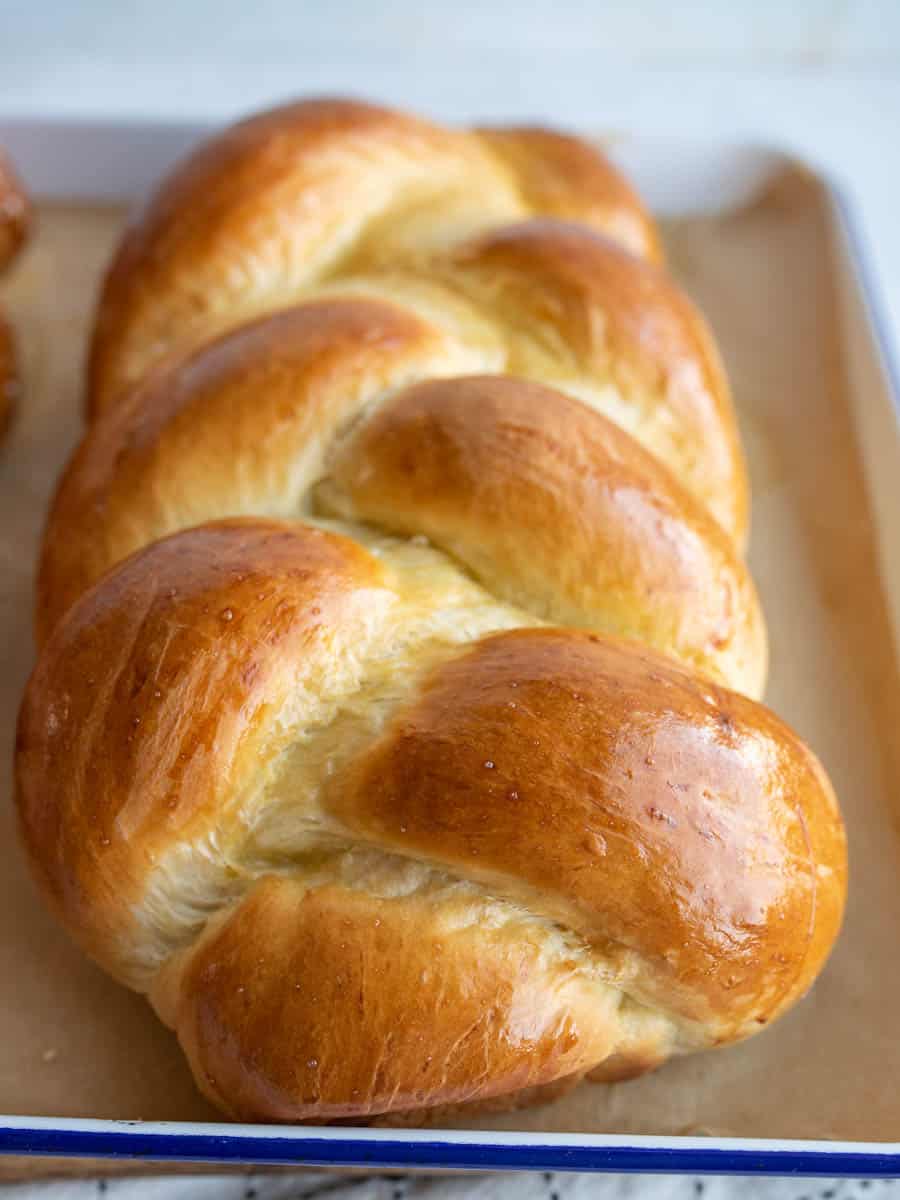
Ingredients
- All-Purpose flour: you can use bread flour here if you have it but I like that it’s a flour I always have on hand.
- Instant yeast: instant, quick, or active yeast all work for this recipe
- Sugar: just a bit to add sweetness and feed our yeast
- Margarine or butter: You can use stick margarine or butter for this recipe depending, they both work great. Margarine is used to make this dish part of a Kosher meal and if that’s not a need for you, butter tastes great
- Eggs: they help to add fat to the dough and make it very tender
Recipe Instructions
- This is a pretty basic dough recipe and you’ll start by adding your ingredients without all of the flour and then mixing them well to get the gluten activated.
- Continue to add more flour until a lightly sticky and tender dough comes together and knead the dough well.
- Let the dough rise and then dived and braid and let rise again.
- Add an egg wash to the bread and then bake. This bread is great warm and at room temperature.
Tips to prevent the challah bread from pulling apart and being lighter colored in the center:
- Let the challah bread rise to fully doubled the first rise and again until fully doubled the second rise. If you put the bread in the oven while the yeast is still too active, it makes them split more.
- Egg was the bread when it first goes in the oven AND again after the bread has baked for 10 minutes, putting the egg wash on the parts of the bread that spread a bit and didn’t get egg wash on them the first time. This helps a ton when it comes to the appearance.
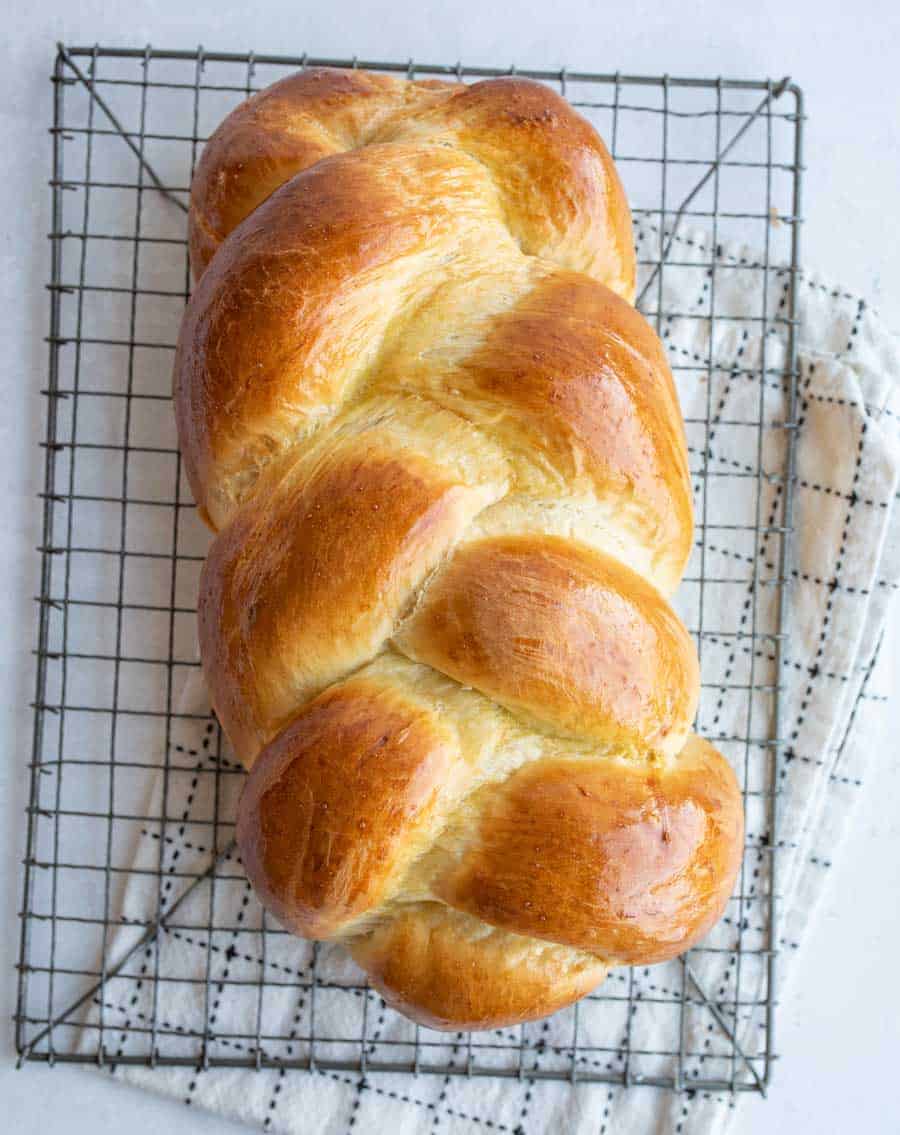
Frequently Asked Questions
Challah comes from the Hebrew word that is used to mean the first portion of your dough. In the Bible, challah is the part of the bread that is set aside and given to the priests.
While challah bread looks complicated, it is actually a pretty basic yeast bread to make.
Challah is pronounced “ha-luh” because the c is silent.
Challah bread tastes like a cousin to brioche bread. It is soft, pillowy and tastes a bit like honey. It is sweet and will look pretty served at your feast.
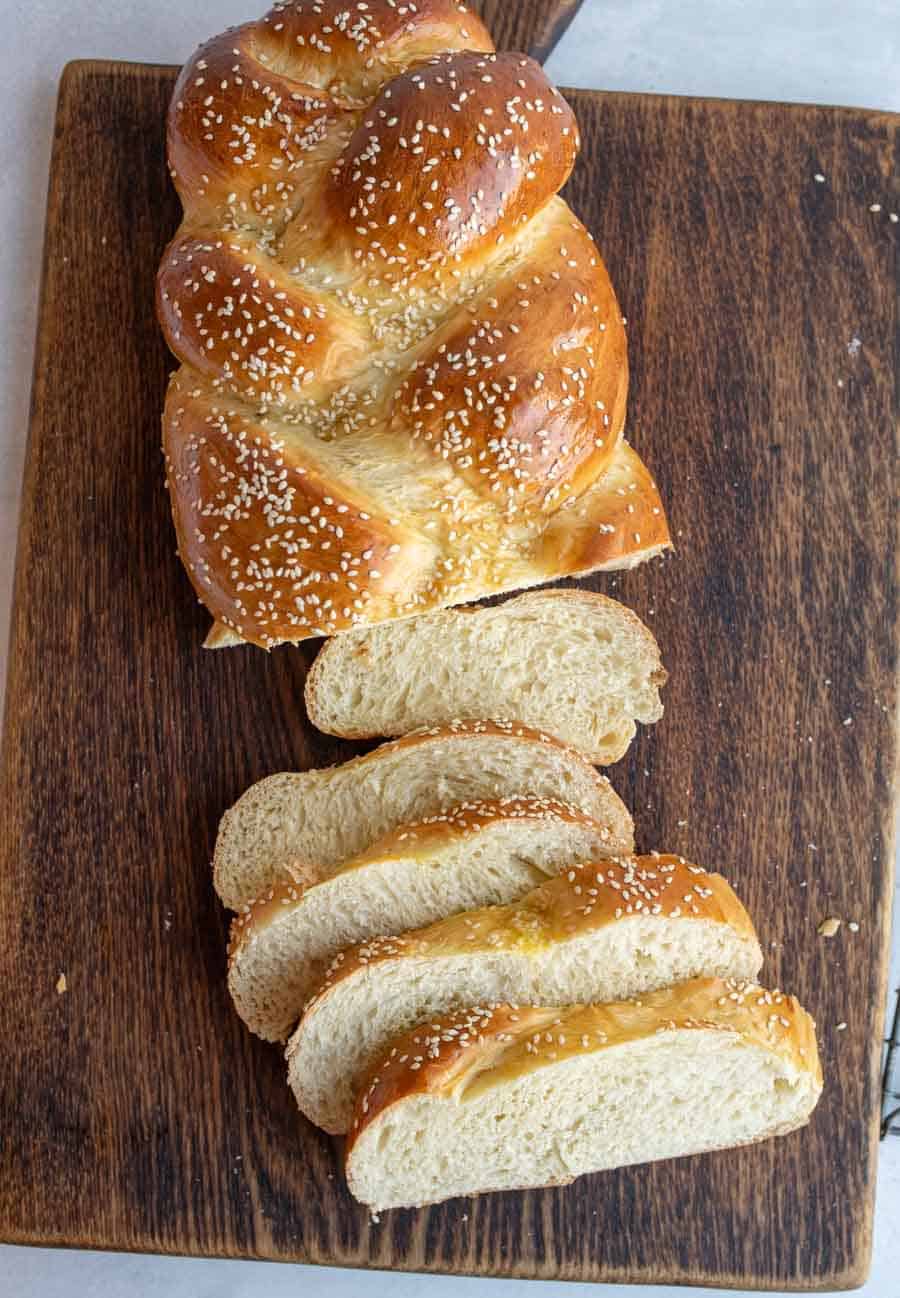
More Recipes
- Parmesan Focaccia Bread
- Jolyn’s Extra Soft White Bread Recipe
- Soft Sourdough Sandwich Bread
- Cinnamon Babka
Did you try this recipe? Leave a ⭐️ rating below and share it on Instagram, Facebook, and Pinterest!
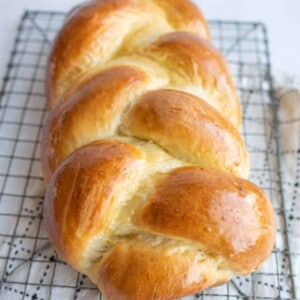
Challah Bread
Ingredients
- 5-6 cups all-purpose flour
- 2 tablespoons instant yeast, or 2 packages
- ½ cup granulated sugar
- 2 teaspoons salt
- 1/2 cup stick margarine, or butter, at room temperature
- 1 ½ cups hot tap water
- 2 eggs, at room temperature
- 1 egg beaten
Instructions
- Combine 2 cups flour, yeast, sugar and salt in the bowl of your stand mixer, using the cookie paddle attachment, mix to combine.
- Add the margarine or butter and beat with the paddle attachment to incorporate. Beat until the butter is mixed in and makes a crumbly mixture, about 2 minutes.
- Swap out the cookie paddle for the dough hook attachment. Add the hot water to the bowl all at once. Mix at medium speed for 2 minutes. Scrape bowl occasionally as needed. Add the eggs and mix until well combined, another 1-2 minutes.
- Gradually stir in enough of the remaining flour to make a soft dough that leaves the side of the bowl (I typically will use 5.5 cups total of flour but it will vary a little in your kitchen).
- Knead the soft dough in the stand mixer for 8-10 minutes, until smooth and elastic.
- Cover the bowl with plastic wrap and then a towel. Let rest for 40-60 minutes or until doubled in size.
- Punch the dough down and divide into two balls. Divide one ball into 3 more pieces and roll them to about 1 inch thick logs (roughly 10 inches long). Braid the pieces together and then tuck the unbraided ends tightly under the ends of the loaf. Place on a parchment or baking mat lined baking sheet. Repeat with other half of the dough.
- Cover loosely and let rise until double in volume. About 1 hour.
- Brush with beaten egg glaze and bake at 375 degrees for 25 minutes. Let cool for at least 15 minutes before serving. It's great warm or at room temperature.
Notes
- Challah bread is shaped different for different occasions. It’s most commonly braided for Shabbat dinner and it’s generally coiled into a circle for Rosh Hashanah, the Jewish new year, symbolizing eternal life (among other things). It will also often have raisins added for Rosh Hashanah to wish those eating it a sweet new year (or it might also be dipped in honey). Two loaves of bread are on the table for Shabbat to signify that when the children of Israel were wondering in the wilderness a double portion of manna came from heaven before the sabbath so that they extra portion could be eaten on the sabbath.
- Here’s how to coil your dough for Rosh Hashanah or I’ll often make it this way as it’s a little simpler than braiding. Punch the dough down and divide into two balls. Roll into a long rope about 1 inch in diameter. Starting at the center of a greased deep dish pie pan wrap the dough in a spiral or snail shape. Cover loosely and let rise until double in volume. About 1 hour, bake as directed. There are also gorgeous braided round loaf tutorials online if you are feeling extra fancy.
- Extra bread that has cooled completely can be wrapped in foil and then wrapped in plastic wrap (or stuck in a freezer bag) and frozen for up to 3 months. Thaw overnight and reheat, still wrapped in the foil but out of the plastic, in a warm oven.
Nutrition
I can’t thanks Vibe Israel enough for taking me on such a delicious trip through Israel. I’m excited to share more about it in a coming post!
This recipe comes from my friends Jeff and Britt (owners of the beautiful Dark Sky RV) whom we have enjoyed learning so much about Jewish cuisine from. They’ve introduced us to this amazing challah bread recipe, latkes, halva, matzah ball soup, gefilte fish, and more. It’s so fun having friends who enjoy sharing their traditions with us.
Challah Bread is a beautiful and delicious testament to Jewish culinary tradition and whether or not you are Jewish, it’s a beautiful bread to enjoy in your home with your family. It’s a memory maker!

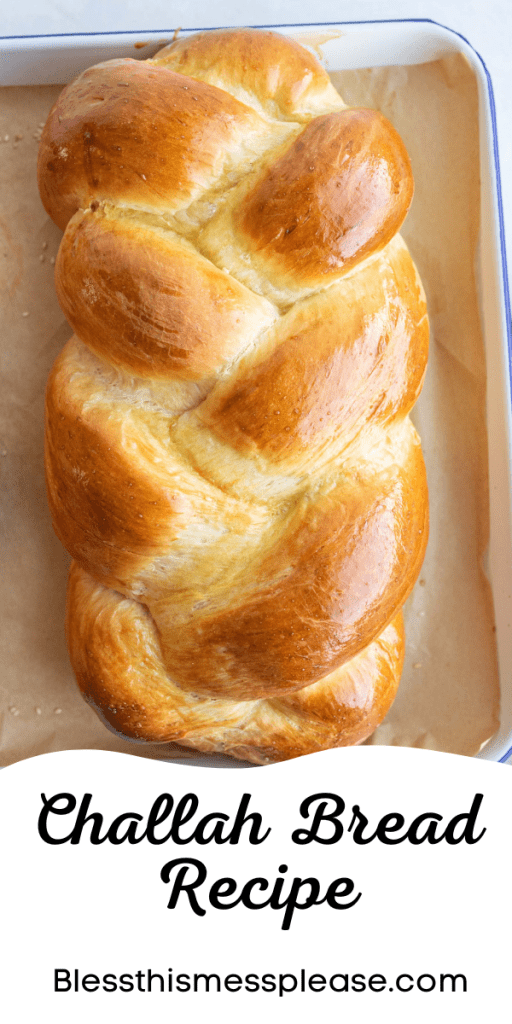
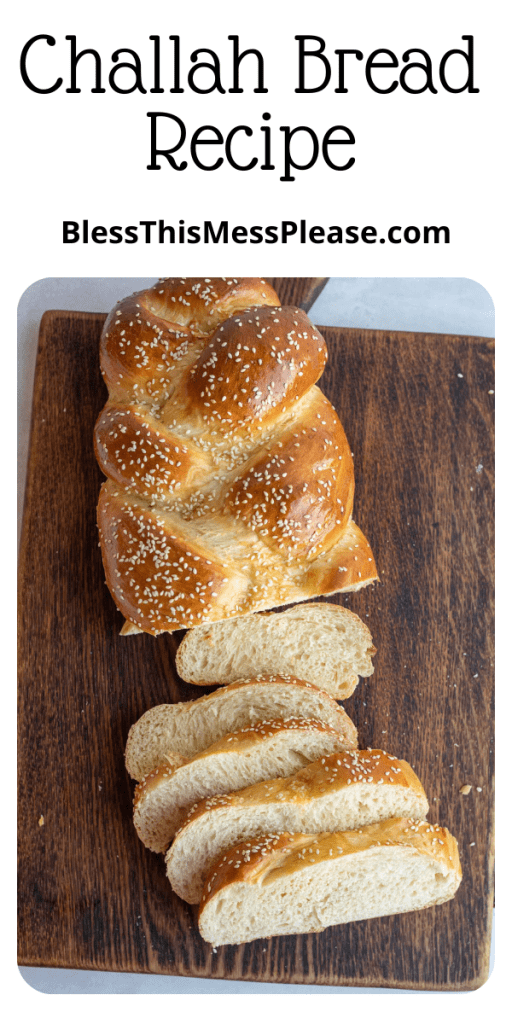
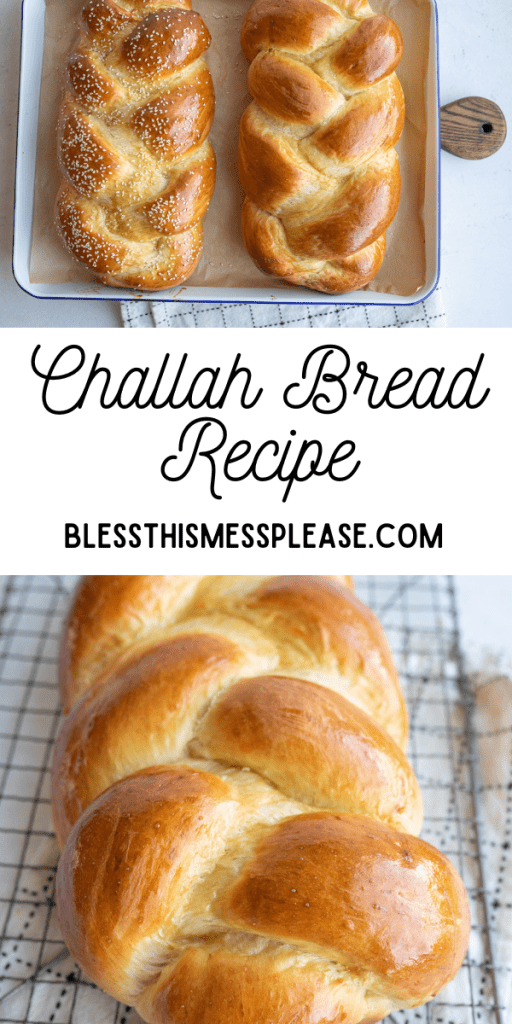
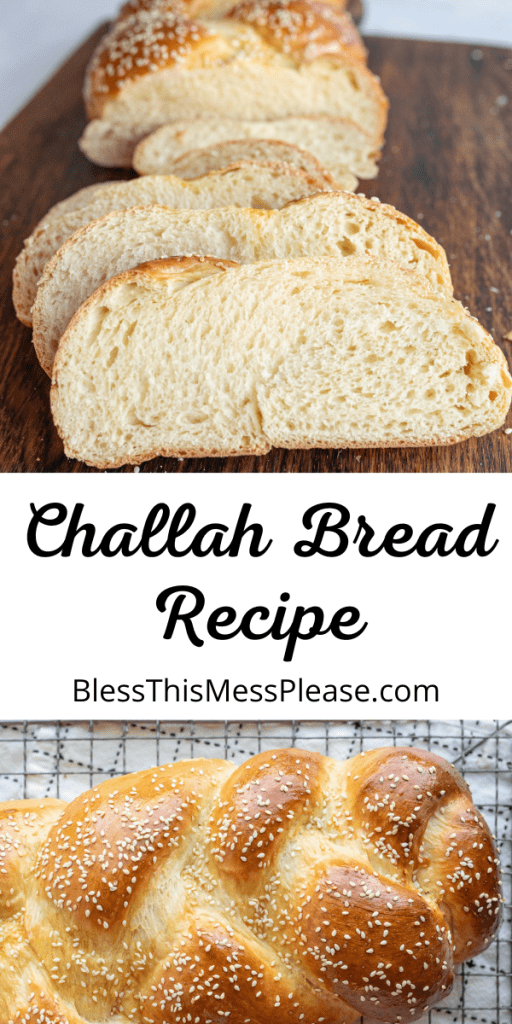






I have tried so many Challah recipes and this is the best by far. Thank you Melissa.
I’m so glad you like it as much as we do Theresa!
Love this recipe!! Newbie to bread making and this recipe was easy and delicious!!! Enjoyed the bonus information regarding Jewish traditions with this bread!
Super easy recipe, tastes great, makes 2 loaves, everyone loved it and they took it all home.
Turned out perfect! Thanks for sharing!
Love the recipe…dislike the perpetual popup adds that obscure the text while trying to read. I have made another recipe that used a six strand loaf. That was fun to do a little challenging the first time. Makes great French Bread.
Thank you for sharing your recipe and beautiful story! God bless and Shabbat Shalom!
Shabbat Shalom Nadia, I appreciate your kindness. I hope you enjoy the bread!
I love this recipe! The challah always comes out perfect and I’ve tested quite a few recipes. This one is fool-proof if you follow the instructions. Thanks Melissa! You always have the best stuff.